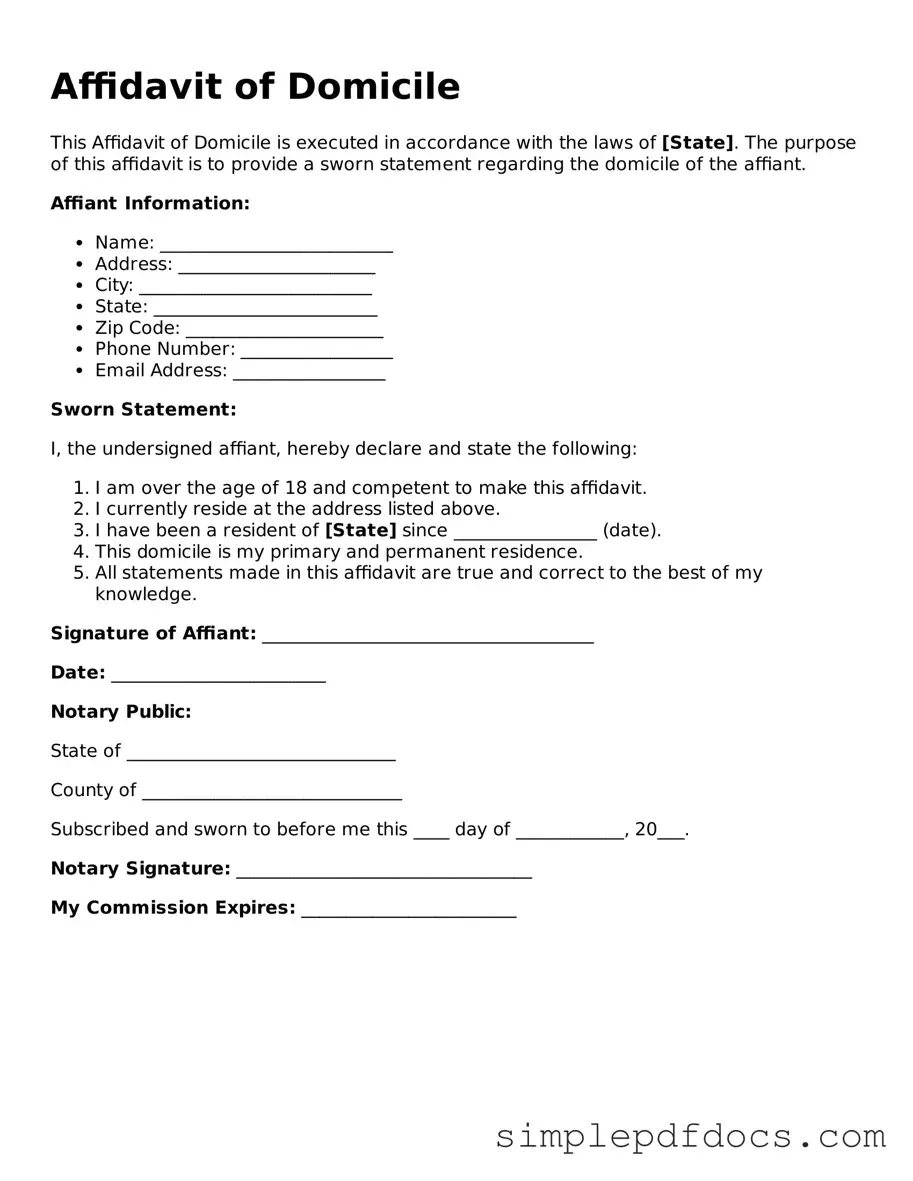Attorney-Approved Affidavit of Domicile Form
The Affidavit of Domicile is an important legal document that serves to establish an individual's permanent residence, particularly in matters related to estate administration and probate proceedings. This form is often utilized when a person passes away, and their assets need to be transferred to heirs or beneficiaries. By providing a sworn statement of where the deceased resided at the time of their death, the affidavit helps clarify jurisdictional issues and ensures that the estate is handled according to the laws of the appropriate state. Completing the form typically requires the signature of a witness or notary, adding a layer of authenticity to the claims made within it. It is crucial for executors and personal representatives to understand the significance of this document, as it can influence tax implications and the distribution of assets. Additionally, the Affidavit of Domicile may be requested by financial institutions or insurance companies before releasing funds or property, making it a vital component in the estate settlement process. Understanding the nuances of this form can streamline the legal proceedings that follow a loved one's passing, making it easier for families to navigate what can be a complex and emotional time.
More Affidavit of Domicile Types:
Affidavit of Death Form California - It may also facilitate the process of claiming social security benefits for surviving family members.
When dealing with legal documentation, having access to the right resources is essential, and you can find valuable information about handling affidavit forms at https://affidavit-form.com, which provides guidance on the preparation and submission of these crucial documents.
Landlord Letter Statement - Witness signatures can bolster the credibility of the affidavit.
PDF Details
| Fact Name | Description |
|---|---|
| Purpose | The Affidavit of Domicile is used to establish an individual's legal residence for purposes such as estate administration and taxation. |
| State-Specific Requirements | Each state may have its own requirements for the Affidavit of Domicile. For example, in California, it is governed by California Probate Code Section 13100. |
| Notarization | This form typically needs to be notarized to confirm the identity of the person making the affidavit and to ensure its legal validity. |
| Use in Probate | It is often required in probate proceedings to clarify the decedent's last known residence, which can affect how their estate is handled. |
How to Write Affidavit of Domicile
After gathering the necessary information, you will be ready to fill out the Affidavit of Domicile form. This document requires specific details about your residence and identity. Follow these steps carefully to ensure accurate completion.
- Begin by entering your full name in the designated space at the top of the form.
- Provide your current address, including the street number, street name, city, state, and ZIP code.
- Indicate the length of time you have lived at this address.
- If applicable, include any previous addresses where you have resided in the past few years.
- State your date of birth to confirm your identity.
- Sign the form in the space provided, ensuring your signature matches your name as written above.
- Find a notary public to witness your signature. They will need to sign and stamp the document.
- Make copies of the completed affidavit for your records and any necessary parties.
Dos and Don'ts
When filling out the Affidavit of Domicile form, it's important to follow certain guidelines to ensure accuracy and compliance. Below are some key points to consider.
- Do: Provide accurate information about your current residence.
- Do: Sign the affidavit in the presence of a notary public.
- Do: Include the date when you became a resident of the stated domicile.
- Do: Keep a copy of the completed affidavit for your records.
- Don't: Leave any sections of the form blank.
- Don't: Use incorrect or outdated information.
- Don't: Forget to check for any specific requirements in your state.
- Don't: Submit the affidavit without proper notarization.
Documents used along the form
The Affidavit of Domicile is a crucial document that helps establish a person's legal residence, often used in estate planning and probate matters. However, it is frequently accompanied by other forms and documents that provide additional context or support. Here are some common forms that are often used alongside the Affidavit of Domicile:
- Last Will and Testament: This document outlines an individual's wishes regarding the distribution of their assets after death. It serves as a guiding tool for executors and can clarify the intent behind the Affidavit of Domicile.
- Death Certificate: This official document verifies the death of an individual. It is often required to accompany the Affidavit of Domicile, especially in probate proceedings, to confirm that the person whose domicile is being established has indeed passed away.
- Affidavit of Gift: A vital document for recording the transfer of property as a gift, ensuring clarity and legality in the process. For more information, refer to Documents PDF Online.
- Power of Attorney: A Power of Attorney grants someone the authority to act on behalf of another individual in legal or financial matters. This document can be relevant when dealing with estate issues and may be referenced in the Affidavit of Domicile.
- Property Deeds: These documents provide proof of ownership for real estate. They may be necessary to demonstrate the connection between the deceased and their property, reinforcing the claims made in the Affidavit of Domicile.
Understanding these accompanying documents can enhance clarity and ensure that all legal matters are handled smoothly. Each plays a unique role in the broader context of estate management, providing necessary information and supporting the claims made in the Affidavit of Domicile.
